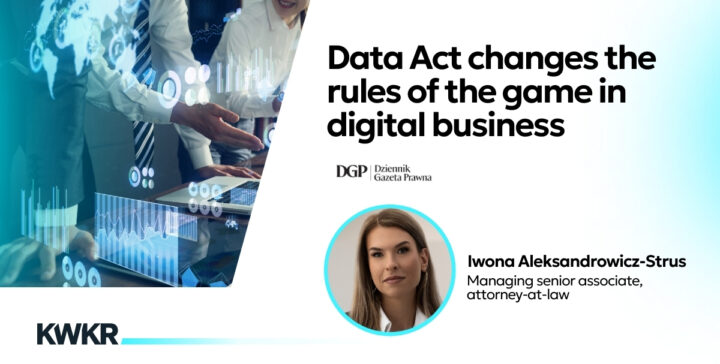Iwona Aleksandrowicz-Strus for Dziennik Gazeta Prawna: “The Data Act changes the rules of the game in digital business and enforces a new approach to data”
Starting from 12 September 2025, the Data Act – an EU regulation revolutionizing the rules of data access, portability and sharing – will apply across the entire European Union. IoT companies, cloud service providers and intermediaries will have to ensure interoperability, transparent contracts and free data transfer. Those who fail to prepare in time risk sanctions and the loss of their competitive advantage, writes Dziennik Gazeta Prawna contributor and managing senior associate Iwona Aleksandrowicz-Strus. Read the article in Polish here!

Who must comply with the Data Act
The Data Act is directly applicable, with no need for transposition into national law. It covers IoT device manufacturers, sellers, intermediaries, and providers of digital services (SaaS, PaaS, IaaS). Micro and small enterprises benefit from certain exemptions – though mainly hardware manufacturers – while digital service providers must comply with all obligations regardless of size.
Data Act vs GDPR – two different worlds
Importantly, the Data Act does not replace the GDPR but operates alongside it. While the GDPR focuses on personal data protection, the Data Act regulates access to all types of data – both personal and non-personal – to foster innovation and competition. Businesses must therefore implement both regimes in parallel.
When access to data can be denied
Manufacturers may refuse access to data in strictly defined situations – for instance, where trade secrets are at risk, user safety is threatened, or legal obligations require such refusal. Digital service providers, however, enjoy far less discretion, as the regulation’s objective is to counteract vendor lock-in.
A chance for new business models
The Data Act also creates opportunities – unlocking access to data previously “closed” within the ecosystems of large companies and removing barriers to data portability between providers. This requires courage and readiness to operate in an open and transparent business model. Companies ignoring these changes may soon face significant competitive disadvantages.
Who exactly must comply with the Data Act and what exemptions exist? Does GDPR compliance suffice to meet Data Act requirements? When can a manufacturer deny access to data, and do digital service providers enjoy similar rights?
Iwona Aleksandrowicz-Strus addresses these and many other questions in her article published in Dziennik Gazeta Prawna.

